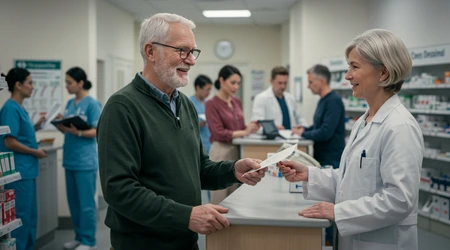Free Prescriptions and Healthcare Support in the UK

Free Prescriptions and Healthcare Support in the UK form the cornerstone of an equitable healthcare system, ensuring no one is left behind.
The National Health Service (NHS) delivers critical medical access, particularly for those with limited means, fostering a healthier, more inclusive society.
This lifeline, rooted in decades of public health policy, addresses financial barriers while promoting well-being. Why should anyone face the choice between medicine and meals?
In this article, we’ll explore how Free Prescriptions and Healthcare Support in the UK empower individuals, reduce health disparities, and strengthen communities, with practical insights and real-world examples.
The NHS, established in 1948, revolutionized healthcare by prioritizing universal access. Today, in 2025, Free Prescriptions and Healthcare Support in the UK remain vital, especially amid rising living costs.
From chronic illness management to mental health services, these programs alleviate financial stress, ensuring equitable care.
This article dives into their benefits, real-life impacts, and how they shape a healthier future, using current data and actionable insights to inform and engage readers.
The Pillars of Free Prescriptions in the UK
Free Prescriptions and Healthcare Support in the UK remove financial obstacles for millions, ensuring access to essential medications.
In England, prescriptions are free for specific groups, including those under 16, over 60, or with certain medical conditions like diabetes. This targeted approach prioritizes vulnerable populations, reducing the burden of healthcare costs.
For example, consider Sarah, a single mother in Manchester with type 1 diabetes. Without Free Prescriptions and Healthcare Support in the UK, her insulin costs could consume her budget.
++ Pension Credit Explained: How to Maximise Your Benefits UK
Free prescriptions allow her to manage her condition without sacrificing rent or groceries, illustrating the policy’s direct impact on daily life.
Beyond immediate relief, this system promotes long-term health stability. By ensuring access to medications, Free Prescriptions and Healthcare Support in the UK prevent complications, reducing hospital admissions.
A 2023 study by the University of Otago found that free prescriptions lowered hospitalization rates, saving up to $18 per dollar spent on charges.

Tackling Health Inequalities Head-On
Access to Free Prescriptions and Healthcare Support in the UK bridges gaps in health equity, particularly for low-income communities.
Socioeconomic disparities often exacerbate health issues, but free prescriptions level the playing field, ensuring everyone can afford treatment.
Take John, a retired factory worker in Birmingham with hypertension. Without Free Prescriptions and Healthcare Support in the UK, his medication costs could force tough choices.
Also read: Jobseeker’s Allowance vs. Universal Credit: Key Differences Explained
Free access ensures he maintains his health, reducing risks like heart attacks and easing pressure on the NHS.
This policy also fosters trust in healthcare systems. When people access Free Prescriptions and Healthcare Support in the UK without financial strain, they’re more likely to seek timely care. This proactive approach prevents minor issues from escalating, saving lives and resources.
Mental Health Support: A Growing Priority
Mental health services, part of Free Prescriptions and Healthcare Support in the UK, have gained prominence in 2025. Free access to antidepressants and therapy ensures mental health care is not a luxury, addressing a critical public health need.
For instance, Emma, a London student, relies on free antidepressants to manage anxiety. Free Prescriptions and Healthcare Support in the UK enable her to focus on studies without financial worry, highlighting the program’s role in supporting young adults.
Read more: UK Benefits System Explained: What You Might Be Missing Out On
Recent NHS initiatives, like the 2025 expansion of Martha’s Rule helplines, show a commitment to holistic care. These services, integrated with Free Prescriptions and Healthcare Support in the UK, ensure timely interventions, with 4,906 calls leading to 241 lifesaving actions.
The ripple effect is profound. By prioritizing mental health within Free Prescriptions and Healthcare Support in the UK, the NHS reduces stigma and encourages early intervention. This approach not only improves individual outcomes but also strengthens community resilience.
Economic and Social Ripple Effects
Free Prescriptions and Healthcare Support in the UK extend beyond health, driving economic stability. By removing medication costs, individuals can allocate funds to essentials like housing or education, boosting local economies.
Consider a small business owner in Leeds with asthma. Free Prescriptions and Healthcare Support in the UK ensure she can afford inhalers, allowing her to work consistently. This stability supports her business, employees, and the local economy, creating a virtuous cycle.
| Benefit | Impact | Example |
|---|---|---|
| Free Prescriptions | Reduces financial stress | Sarah’s insulin access |
| Mental Health Support | Lowers stigma, encourages care | Emma’s therapy access |
| Economic Stability | Boosts local economies | Leeds business owner |
Moreover, Free Prescriptions and Healthcare Support in the UK enhance workforce productivity. Healthy employees miss fewer workdays, contributing to economic growth. In 2025, with NHS funding increases cutting waiting lists, these benefits are more evident than ever.
Empowering Communities Through Accessibility
The accessibility of Free Prescriptions and Healthcare Support in the UK fosters community cohesion. When healthcare is equitable, trust in public institutions grows, encouraging civic engagement and social unity.
Imagine a rural Yorkshire community where elderly residents rely on Free Prescriptions and Healthcare Support in the UK. Free medications ensure they remain active, volunteering and mentoring youth, strengthening community bonds.
This system also empowers marginalized groups. By providing Free Prescriptions and Healthcare Support in the UK, the NHS ensures refugees and low-income families access care, promoting inclusion. This approach builds a society where health is a shared priority.
A Future-Proof Healthcare Model

Looking ahead, Free Prescriptions and Healthcare Support in the UK are poised to evolve with technology and policy advancements. Innovations like the 2025 NHS artificial pancreas for diabetic mothers highlight a commitment to cutting-edge care.
This forward-thinking approach, rooted in Free Prescriptions and Healthcare Support in the UK, ensures adaptability. Telehealth and AI-driven diagnostics will further enhance access, making healthcare more responsive to patient needs.
Ultimately, Free Prescriptions and Healthcare Support in the UK serve as a model for global healthcare systems. By prioritizing equity and innovation, the UK sets a standard for inclusive health policies, inspiring change worldwide.
Conclusion: A Healthier, Fairer Tomorrow
Free Prescriptions and Healthcare Support in the UK are more than policies they’re a promise of dignity and care for all.
From Sarah’s insulin to Emma’s therapy, these programs transform lives, proving health is a right, not a privilege.
They reduce disparities, boost economies, and strengthen communities, creating a ripple effect of well-being. A
s the NHS evolves in 2025, embracing innovations like AI and telehealth, Free Prescriptions and Healthcare Support in the UK remain a beacon of hope.
Let’s celebrate this system that asks not for wealth but for the chance to thrive, ensuring a healthier, fairer tomorrow for every Briton.
Frequently Asked Questions
Who qualifies for free prescriptions in the UK?
Those under 16, over 60, pregnant, or with conditions like diabetes or epilepsy qualify, alongside low-income individuals on specific benefits.
How does free healthcare support impact mental health?
It provides access to therapy and medications, reducing stigma and enabling early intervention, as seen in Emma’s case with free antidepressants.
